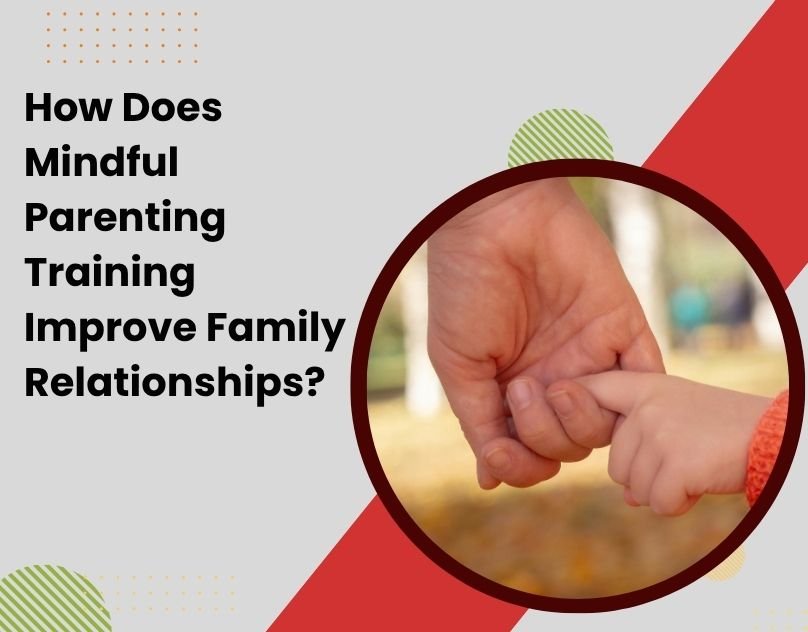Imagine this: your child is having a meltdown over spilled milk, homework isn’t done, and you’re running late for work. Your patience thins, your voice rises and suddenly, both of you feel upset. Many of us know this moment all too well. Parenting can be deeply rewarding yet emotionally exhausting. But what if there was a way to navigate these daily storms with calm and connection? That’s where mindful parenting training comes in. This approach helps you slow down, respond thoughtfully, and nurture stronger, more peaceful family relationships.
What is Mindful Parenting?
At its heart, mindful parenting means being fully present with your child listening, observing, and responding with awareness rather than reacting impulsively. It’s about paying attention to the present moment, without judgment or the urge to fix everything immediately.
Mindful parenting is not about being a perfect parent or allowing children to do whatever they want. It’s not a soft or permissive approach it’s a conscious one. It trains your own mind and emotions so that you can guide your child with clarity and compassion, even during chaos. In essence, mindful parenting training is an emotional fitness program for parents. The goal isn’t perfection it’s presence.
The Ripple Effect: How Mindful Parenting Transforms Your Family
From Reactive to Responsive
We’ve all been there snapping at our kids after a long day, only to feel guilty later. Mindful parenting helps us pause before reacting. Instead of yelling, we learn to take a deep breath, recognize our frustration, and respond calmly. Over time, this shift from reaction to response breaks the cycle of stress-driven communication. Children feel safer and more understood, while parents feel more in control of their emotions.
Strengthening the Parent-Child Bond
Children thrive on feeling seen and heard. When we practice mindfulness, we give them the gift of undivided attention. Imagine sitting with your child, truly listening not half-distracted by your phone or to-do list. This simple act of presence nurtures trust and emotional closeness. It tells your child, “You matter.” Over time, this consistent presence deepens the parent-child connection, helping your child feel secure and valued.
Becoming an Emotional Coach for Your Child
One of the most powerful outcomes of mindful parenting training is learning to become an emotional guide rather than a controller. When you can stay calm through your child’s big emotions, you model how to handle them. This is where emotional intelligence plays a key role.
By practicing mindfulness, you start to understand your own emotional patterns anger, impatience, guilt and manage them effectively. Once you can do that, you naturally teach your child how to identify and regulate their feelings. If you’re eager to strengthen this skill, you can learn emotional intelligence online through guided courses or mindfulness programs that teach emotional awareness, empathy, and communication. These skills don’t just benefit your child they reshape how your entire family interacts.
Reducing Household Stress
When one person in a home practices mindfulness, it often transforms the entire household. Parents who stay grounded can respond to challenges calmly, reducing overall tension. Children mirror this energy less shouting, fewer conflicts, and a lighter emotional atmosphere. Managing parent stress through mindful awareness creates an environment where everyone feels emotionally safe. Over time, the home becomes less about discipline and more about understanding.
Getting Started: Simple Steps to Practice Today
You don’t need hours of meditation or special tools to begin. Here are some small, practical ways to bring mindfulness into your daily parenting:
The Pause and Breathe Technique
Before reacting to your child’s behavior, pause. Take three slow, deep breaths. This moment of awareness gives you the space to choose your response rather than reacting on impulse. Over time, this simple pause becomes a superpower for emotional regulation.
Practice Mindful Listening
Set aside five minutes each day to listen to your child—no interruptions, no advice, no multitasking. Just listen. You’ll be surprised how this focused attention strengthens your bond and helps your child open up.
Acknowledge Your Own Emotions
Parenting triggers a wide range of emotions anger, sadness, frustration, joy. Instead of judging yourself, notice your feelings. Say to yourself, “I’m feeling angry right now, and that’s okay.” This awareness helps you respond consciously and prevents emotional buildup.
Create a Family Mindfulness Moment
End the day with a simple mindfulness ritual deep breaths together, sharing one thing you’re grateful for, or reflecting on a happy moment. These small practices teach children to stay connected to their emotions and foster gratitude.
If you want to deepen these skills, consider exploring programs that help you learn emotional intelligence online. They can guide you step-by-step in managing emotions, improving communication, and staying calm under pressure skills that make family life smoother and more joyful.
Conclusion
Mindful parenting isn’t about changing your child it’s about transforming how you show up as a parent. Through mindful parenting training, you cultivate patience, emotional awareness, and compassion, which naturally ripple through your family. You’ll find fewer power struggles, more cooperation, and deeper love.
Remember, this journey isn’t about doing it perfectly it’s about practicing daily presence, even in small moments. Each time you pause, breathe, and choose connection over control, you strengthen your family’s emotional foundation.
If you’re ready to take the next step, consider exploring ways to learn emotional intelligence online. It’s a gentle, practical path to building a calmer, more connected, and more mindful home one moment at a time.
















Leave a Reply